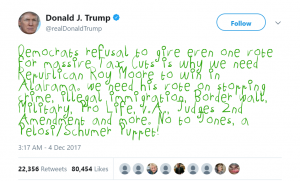Senate candidate Roy Moore enforces irrational values when refusing to admit his past actions or the nefarious nature of those actions. Moore has been pressured to withdraw from the Alabama race following accusations of making sexual advances towards teenage girls during his thirties. Though Moore initially lost support when the allegations were published, President Donald Trump endorsed him to increase Republican representation, leading to discrete funding reinstatement from the Republican National Convention (RNC) to restore “get-out-the-vote funds,” bolstering the Republican Party in Alabama.
By endorsing Moore, government officials fail to define ethical behavior and the desired consequences of that behavior. Molesting children is prohibited by law, yet Moore cannot reasonably be tried for a decades old alleged crime. The safety of children is a rational value, unshared by predatory Moore and %48 of Alabama voters. Harming children is already a crime, leaving the question of how we as ethical and free individuals will remain steadfast in morality, asking if we will choose not to be represented by those who attack the innocence and safety of children. Moore will maintain irrational values, favoring his own survival as a politician and as a member of society over considerations of good or evil. As Moore must preserve himself, we the nation must preserve our high standards of value and integrity.
Man has no authority over his abilities to feel that something benefits him or is evil. What he will consider joyous or painful, love or hate, desire or fear, depends on his standards of value and reality. If he chooses irrational values, as many Alabama voters are, he switches his emotional capacity from protection to destruction. The irrational is the impossible; it contradicts the facts of reality; facts cannot be altered by desire but can destroy those who desire impossibilities. If Moore wishes to live free as a child molester and represent the American people, he will disintegrate his consciousness; turning his personal life into a dark, morbid war with meaningless conflict (matching the objectivist attitudes of most people today).
Like the President and the RNC, Moore will always alter his ethics and behavior in such a way that benefits himself and his party–for survival, not reality or facts. Choosing to remain complicit amid allegations of harassment upholds objectivism and fails agreed-upon societal standards, such as: rape, murder, and assault, especially of children, are immoral and reprehensible. Because Moore’s victims were teenage girls, aspects of their innocence and naivetë is overlooked and confused with consenting womanhood, which is additionally confused with enticement and feminine virtue. Government sponsors, such as the RNC, would not support Moore if it were morally and socially agreed upon that sexual harassment and assault is undeniably evil, threatening the safety, freedom, and potential happiness of affected victims.

President Trump utilitarianistically claimed that Moore’s alleged crimes should go unpunished so that he can pursue justice as a Senator, ending other crimes and implying that whatever injustice Moore prevents as Senator will be more important to the nation’s security than preventing assault and harassment, despite domestic violence being the leading factor in the premature deaths of women globally and in the United States. Those who have been or may be accused of assault redefine ethics to protect each other. If Moore’s actions are unethical, the President’s and other representatives’ past actions will be so, losing societal protection for their irrational emotions, urges, thoughts, whims, or desires. If the President is surrounded by others with objectivist ideals, he will receive a licence to do as he pleases, altering fact and reality to avoid portraying himself as a selfish brute in the altruists’ image.
The greatest historical Orator, Aristotle, felt ethics and decency were skills that could be practiced and refined, like physical and mental excellency. Because these assaults were sins of Moore’s past, if he were to renounce his candidacy, he could be ethical now. His decision to remain in Alabama’s Senate race is a dismissal of his wrongdoing. Moore has not refined his ethics as Aristotle taught, continuing to uphold objectivism and irrational standards of value. By funding Moore, the RNC also complies with objectivism, distorting virtue and social morality for political gain, ignoring a social contract with the government to protect us, the people, who adhere to paying taxes and new legislative regulations. The independence of self is important, and should only be mandated in as much as liberty is protected.
The RNC and President are failing to protect children and victims of assault, belittling their roles as government entities and responsible citizens. The RNC is actively redefining ethics in its own interest, and will continuously give ethics new definitions that benefit its party over Americans. Politics is partisan, but maintaining bipartisan codes of ethics would enforce virtuous conduct and prevent candidates like Moore from objectivist behavior. Complicity toward low standard values (by government officials, candidate Moore, and pro-Moore voters in Alabama) supports the ability to change what is considered right and wrong at the expenses of children and liberty.

